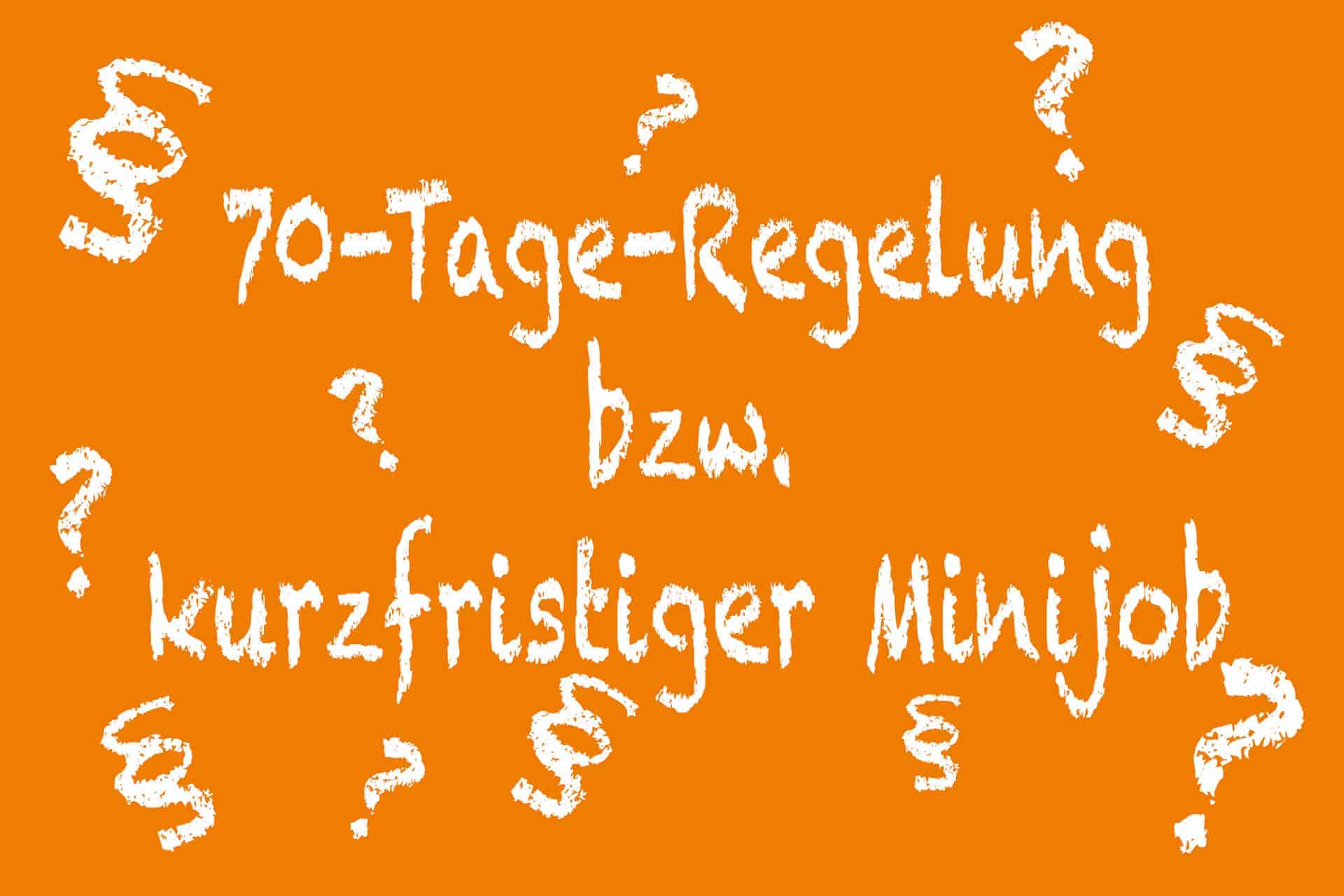The extension of the 70-day rule - what students need to know
22.01.2019

Viele Studenten gehen einer kurzfristigen Beschäftigung nach. Aber was bedeutet das eigentlich im Detail, welchen Stellenwert darf die Beschäftigung einnehmen?
In this article, we will tell you everything you need to know about the 70-day rule for short-term mini-jobs.
The most important information for promoters, hosts, hostesses and service staff at a glance
- The working time is limited to Limited to 70 days per year.
This means that each employee may take leave for a maximum of 70 days, or 3 months continuously (with a 5-day week) work as a short-term employee. - The exercise may non-professional take place.
Each of the short-term mini-jobs carried out may therefore only be of minor economic importance. - There is No social security obligation.
You do not have to pay social security contributions because your employment is only short-term. - It exists No earnings limit.
Your salary is not subject to any limits, either in terms of hours or total time. - The Income tax liability applies despite marginal employment.
Every employer is obliged to pay income tax first. A refund is made as part of the tax return. However, this can only be prepared at the end of the year.
Extension of the 70-day rule for 2019
The time limit for the Short-term employment was increased from 50 days to 70 days in 2015. With a 5-day week, this means a maximum continuous working period of 3 months for each job.
This regulation, which was initially limited until 31 December 2018, will now also apply in 2019 following the introduction of the Qualification Opportunities Act on 18 December 2018.
Even though the law was primarily created to attract foreign seasonal workers during the harvest season, students in particular benefit from the longer working hours.
Tax duties in the context of short-term employment
Both the employee and the employer must pay contributions, as the Undeclared work otherwise the floodgates would be open.
However, the tax burden is limited and for many people in marginal employment it is fully refundable via the tax return.
The tax treatment of marginally employed workers
The tax class selected in the tax return applies to income tax. For reasons of simplification, the flat rate of 25 % is usually used for short-term employment.
However, depending on the income earned, students who are in short-term employment may receive a refund of the income tax paid at the end of the year. The prerequisite for this is always the preparation of a tax return. In 2019, the tax-free allowance is €9,168 for single people. The basic tax-free allowance is doubled for married couples.
The employer's obligations
Every employer is obliged to declare all employment. In the context of a mini-job, this means registering for statutory accident insurance.
In addition, there is a levy to compensate for illness and during pregnancy or maternity. However, these contributions, known as U1 and U2, account for only 0.9 and 0.24 % of pay respectively, and the additional insolvency benefit contribution only 0.06 %.
The 70-day rule - how the period of employment is made up
For every short-term activity, the question arises as to what extent this is also counted as short-term work within the meaning of the law. Anyone who works in the borderline area should therefore take a closer look at the 70-day rule.
Only actual working days count
In the case of short-term employment, all days worked are calculated. If a Student job For example, 4 weeks from Monday to Friday would result in 20 days of short-term work.
The same applies if the job is only carried out for 4 days per week, so that after 4 weeks only 16 days of capacity have been used up.
Note: Each day started counts as a full day even if only 2 hours were worked.
The delimitation of the non-professional exercise
All employment is generally subject to compulsory insurance. Mini-jobs and short-term employment are the exception here. However, this only applies as long as the job is not intended to be the sole means of subsistence.
This is always the case if benefits are claimed from the Federal Employment Agency. As a student, this is generally unproblematic as long as the 70-day rule is observed.
More than just a mini-job - no problem
To benefit from the exemption from social security contributions, it does not matter how many different jobs you have. The 3-month or 70-day rule must be observed.
However, if you work 3 jobs in parallel, each lasting 23 days a year, you do not exceed the limits so that short-term employment is not considered to be subject to social security contributions.
Your advantages with TRUST Promotion at a glance
TRUST Promotion will pay your income tax for you and you will receive your payslip at the end of the month. By recording the wage tax statement in your tax return, all income is included in the tax assessment notice, which you must submit to the authorities as proof of income.
And best of all, with TRUST Promotion's online portal, the paperwork is history.
Related Posts
Related Posts







